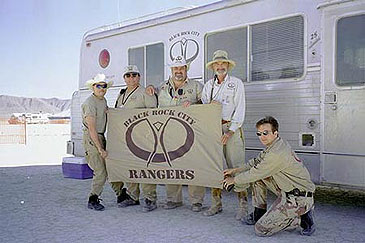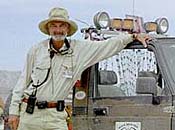The Black Rock Rangers were founded in 1992 when a small band of volunteers equipped with eight CB radios purchased at thrift shops patrolled the desert for strays and stragglers. Since that time, our little village on the playa has become a city that occupies four square miles. The Ranger organization has grown in size and complexity to meet the needs of a city populated by thousands of people.
 In 2001, we fielded 250 dedicated Ranger volunteers. This hard working group forms the “non-confrontational mediating entity” that is responsible for the welfare of every Black Rock City citizen. Rangers are responsible for coordinating emergency medical and fire control services at our event. We design, install and operate our city’s on-site radio communication system, patrol our city’s perimeter and its streets, and stand ready to mediate community disputes or aid any citizen who is lost, sick, or requires information. Rangers dress in khaki-colored uniforms in order to be clearly identifiable. We are the people you will see at the perimeter of burn events at Burning Man, and we are charged with reminding our citizens of public safety rules. In order to become a Ranger, mandatory annual training is required. This training teaches us to deal with many stressful situations. When this is completed, it is said that Rangers even dream in khaki.
In 2001, we fielded 250 dedicated Ranger volunteers. This hard working group forms the “non-confrontational mediating entity” that is responsible for the welfare of every Black Rock City citizen. Rangers are responsible for coordinating emergency medical and fire control services at our event. We design, install and operate our city’s on-site radio communication system, patrol our city’s perimeter and its streets, and stand ready to mediate community disputes or aid any citizen who is lost, sick, or requires information. Rangers dress in khaki-colored uniforms in order to be clearly identifiable. We are the people you will see at the perimeter of burn events at Burning Man, and we are charged with reminding our citizens of public safety rules. In order to become a Ranger, mandatory annual training is required. This training teaches us to deal with many stressful situations. When this is completed, it is said that Rangers even dream in khaki.
This past year saw a considerable reorganization of the Rangers. We decided to follow the tried and tested general model of the Burning Man senior staff, and created a consensus making body called the Black Rock Ranger Senior Staff (BRRSS). Formerly, a small committee supervised the Rangers, but the BRRSS now consists of 12 to 14 people who represent several areas. Each of these areas evolved as a solution to a particular problem or public need. Nearly every function of the Ranger organization is represented on the BRRSS.
A cohesive and reliable means of communication is necessary — yet no phone company exists on the playa. The solution is implemented by our communication branch. Citizens placed in situations of very high stress need a warm and supportive hand. To solve this problem, we created crisis intervention teams. Black Rock City is located miles away from the nearest hospital — hence our medical department. Our city is also devoted to fire art, but it is built from flammable materials. The result is our department of fire safety services.
The foregoing functions are grouped under our Emergency Services Department (ESDR) (link to: section I1) of the Rangers. We are often the first responders to emergencies and we work closely with REMSA , Burning Man’s medical service supplier, and North Tree Fire, our provider of fire safety services. But this is only the beginning of Ranger services. Other Ranger responsibilities include Exodus, which manages the orderly exit of thousands of cars at the end of the event, the Department of Mutant Vehicles that licenses art cars, and the main Gate operation, which includes the protection of its perimeter.
Within an organization as large as the Rangers, it is also necessary to create considerable internal order, with solid organizational and decision-making systems. Decisions that affect the welfare of participants must often be made in highly stressful circumstances, and Ranger training forms an integral part of ourPlaya Operations Department . This department organizes trainings that impart the “Art Of Rangering”, and supervises our innovative mentoring system. This mentoring program pairs new and inexperienced Rangers with our seasoned volunteers. It provides an ideal mechanism for teaching and evaluating new recruits. Finally, our human resources department manages the Ranger offices, scheduling, supplies, the Burning Man laminate system, and a host of other duties that are required to run Ranger playa operations 24/7 for up to 21 days in the desert.
 The Black Rock Rangers also interface with law enforcement. Black Rock City stands at the intersection of several legal jurisdictions. These are represented on the playa by the Pershing County Sheriffs Department, the Washoe County Sheriffs Department law enforcement, Bureau of Land Management Law enforcement, Nevada State Highway Patrol, and other Nevada state agencies. As a non-confrontational mediating agency, the Rangers help to resolve disputes within our community, but they also bridge the gap between the ethos and the culture of our citizens and the needs and responsibilities of law enforcement. As first responders, we are often able to adjust disputes and interpret our city’s rules in ways that avoid conflict. We seek communitarian solutions. We also work cooperatively with law enforcement in dealing with criminal conduct. In addition to our own peculiar rules our no vending policy, our prescribed speed limits, or our ban on firearms Black Rock City is also subject to the same laws that govern public conduct in any city. Every year we call on law enforcement to help us with a very small number of evictions or to deal with violent behavior. This year combined federal and state arrests in Black Rock City significantly decreased. This was due to better participant education before our event and much improved communication with state and federal agencies.
The Black Rock Rangers also interface with law enforcement. Black Rock City stands at the intersection of several legal jurisdictions. These are represented on the playa by the Pershing County Sheriffs Department, the Washoe County Sheriffs Department law enforcement, Bureau of Land Management Law enforcement, Nevada State Highway Patrol, and other Nevada state agencies. As a non-confrontational mediating agency, the Rangers help to resolve disputes within our community, but they also bridge the gap between the ethos and the culture of our citizens and the needs and responsibilities of law enforcement. As first responders, we are often able to adjust disputes and interpret our city’s rules in ways that avoid conflict. We seek communitarian solutions. We also work cooperatively with law enforcement in dealing with criminal conduct. In addition to our own peculiar rules our no vending policy, our prescribed speed limits, or our ban on firearms Black Rock City is also subject to the same laws that govern public conduct in any city. Every year we call on law enforcement to help us with a very small number of evictions or to deal with violent behavior. This year combined federal and state arrests in Black Rock City significantly decreased. This was due to better participant education before our event and much improved communication with state and federal agencies.
Our relationship to law enforcement has matured in recent years as we have gained the trust of these agencies. Our Ranger Law Enforcement Coordinator chairs multi-agency briefing sessions during the event, and we have created several Ranger/law enforcement liaison positions. Our communication dispatch system runs in parallel to law enforcement radio systems, and we have developed protocols for requesting assistance.
One interesting example of cooperation occurred this year. The entire story of what came to be called the Jiffy Lube incident has been described by Larry Harvey in an account first published in our on-line newsletter, the Jackrabbit Speaks. You can read Larry’s account. In a situation perceived by law enforcement as a violation, the Black Rock Rangers succeeded in bringing all parties to the table. A dialogue was held and no one was arrested. In effect, the Rangers meditated a dispute and helped to produce a compromise solution that was agreed to by both parties. We plan to continue this dialogue and seek further solutions as one community addressing another.
In many ways, Burning Man creates an “other-worldly” place. We all enjoy remarkable freedoms in BRC. But it is the Black Rock Rangers who serve to span the gap between the world of Burning Man and the world that exists outside it. This is a very challenging job. While participants throng our streets and the playa, reaping the rewards of their immediate experience, the Rangers must remain mindful of others. We are the facilitators of a freedom that other participants enjoy. Much discipline and a clear-sighted vision of civic welfare are required to perform the many tasks that we confront each year. Even more importantly, every Ranger must be ready communicate with fellow citizens and remain endlessly patient during those interactions.
When they enjoy their time off-duty, Rangers are indistinguishable from other denizens of Black Rock City. A giant salmon dressed in fishnet stockings, a modern primitive with knitting needles and Christmas ornaments sticking out of her head, or someone relaxing in shorts and a t-shirt might be a Ranger. But when they don khaki again, Rangers rejoin a special class of volunteer. Khaki may not be colorful, and a uniform is not exactly a costume. But, for those of us who toil with other volunteers to protect our community and its city, this inexpressive color is a badge of honor. We are proud of our motto: “The Black Rock Rangers: Not the problem, but a part of the solution”.

